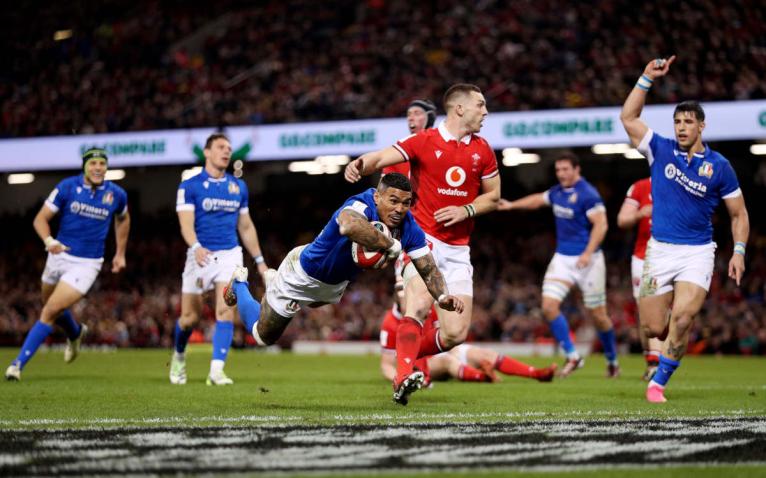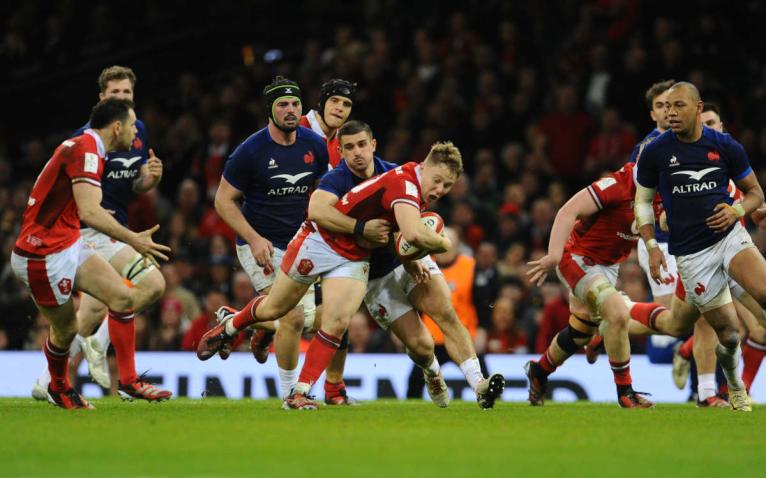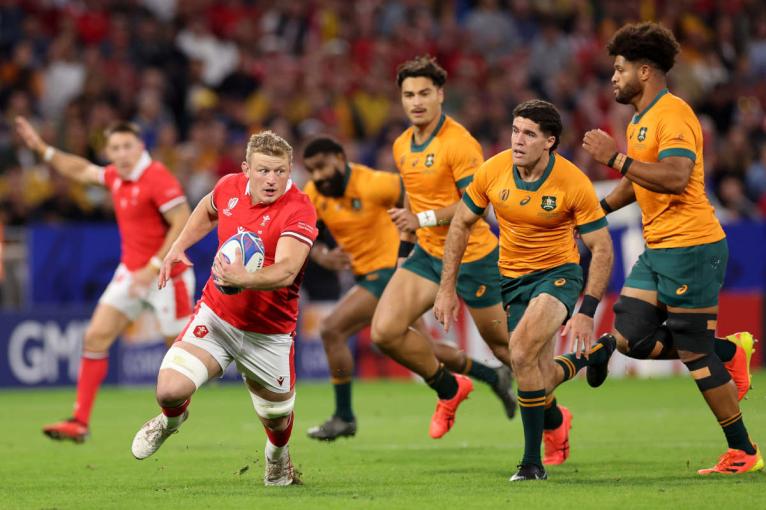There is nowhere quite like the Principality Stadium when the roof is closed and Hen Wlad Fy Nhadau is belted out in unison by more than 70,000 fans. It remains, to this day, a truly unique sporting experience. A coming together in Welsh rugby’s cathedral.
Wales as a land of song still exists, and this was confirmed by the way Max Boyce’s acapella performance of Hymns and Arias was embraced by all before the France game. Many were old enough to remember the way his voice reverberated around the hills and valleys of Wales in the Seventies. More recently Dafydd Iwan’s Yma o Hyd has captured the imagination. Officially the FAW’s anthem, but believe me, it’s claimed by those who call Parc y Scarlets home. The title translates as ‘We’re still here’, a reference to the survival of Welsh culture and language despite times of great hardship – a fitting description of where Welsh rugby now finds itself.
Surviving, but for how long?
“Ultimately, we are in the results business” were words that appeared in the WRU statement in December 2022 when Wayne Pivac was replaced by Warren Gatland. The latter has often referenced that same maxim before matches. “There is always pressure. It’s always been a results business. It’s about winning matches” were Gatland’s words before the opening round this year. A first wooden spoon since 2003 prompted the New Zealander to offer to resign after the Italy defeat deep in the bowels of the Principality Stadium. His offer to fall on his sword was summarily and emphatically turned down by WRU’s new CEO, Abi Tierney.
Parallels with the last time Wales were in this position, can be sought. On the upside, they won a Grand Slam two years later, so there is hope, but domestically the landscape is very different. Back then, the regions topped the then Celtic League in three of the four years that followed. The scenario couldn’t be more different in 2024 because players aren’t returning to winning environments. As it stands, the regions have won just 13 of their 44 games in the URC – a win rate of just 29.6 per cent. Yes, green shoots may be sprouting, notably the Ospreys and Cardiff, but they must be carefully cultivated. At age-grade level, too, the U21s won a Grand Slam, whereas the 2024 vintage came fourth.

There could be no faulting the effort of the team during the tournament, a point regularly emphasized by the coaching staff; Wales topped most attacking rucks hit, boasted the second most carries and second most passes, but when it came to measuring effectiveness rather than volume, their rank plummeted. They were bottom of the table for getting over the gain line, for generating ‘quick’ ball and for exiting their 22m. Worryingly, they failed to score a single point in four halves of rugby, while the 2024 edition saw their sixth lowest total for points scored in a Six Nations and fifth most points conceded.
It has to be stated, however, that there have been positives. For a vocal majority, Gatland’s track record proves he is the man to take this team forward. ‘In Gatland we trust’ seems to be the slogan adopted by fans, and he does have mitigating factors to Wales’ troubles. In the absence of Leigh Halfpenny and Liam Williams, (who combined started 82% of Wales’ games at fullback from 2012-2023, according to respected statistician Russ Petty) Cameron Winnett has been an assured presence patrolling the backfield. The magisterial boots of Taulupe Faletau are not easy to fill but in the comeback against Scotland we saw Aaron Wainwright’s fighting spirit and ability to rally a team. Skipper Dafydd Jenkins and Tommy Reffell were relentless presences at the ruck, with Reffell topping the turnover stats (11) and only a record-breaking Michele Lamaro making more tackles than them. While we await the return of Dewi Lake, Jac Morgan, Taine Plumtree and Christ Tshiunza, who have all been namechecked by Gatland in dispatches, it is now easy to identify a future Wales pack.
Gatland opted for three 10s with just 11 caps between them when the squad was announced. Sam Costelow, who the rookie at the Rugby World Cup, is now the most senior in the squad and often shoulders the blame in a dysfunctional team
Every squad needs depth in every position, but something Wales are blatantly lacking is an authoritative No 10 for the first time in a generation.
Gatland opted for three 10s with just 11 caps between them when the squad was announced. Sam Costelow, who was the rookie at the Rugby World Cup, is now the most senior in the squad and often shoulders the blame in a dysfunctional team, according to former 58-cap Wales fly-half Rhys Priestland. He has also shouldered defensive duties during this campaign, making the third most tackle attempts in the team despite playing 240 minutes.

“There aren’t many 10s in the world that can shine without good shape and a solid foundation.” says Priestland. “Damien Mackenzie or Marcus Smith might be able to create something out of nothing but almost every other 10 around him needs decent shape to be able to perform at his best.
“Take a look at the top two international teams now who arguably have the most sophisticated attack; New Zealand and Ireland. The majority of that is set by the attacking structure and shape of the front five. The way they take the ball to the line, pull it out the back, make good decisions. The game has moved on from when the 10 makes the team tick. So much comes from the front-five forwards – and Wales and Ireland right now are worlds apart.
The second choice fly-half is Ioan Lloyd, who had started just eight matches at 10 before joining the Scarlets this season. In West Wales, he is deputy to his Wales teammate Sam Costelow, something Priestland feels hinders his development.
Regional game time isn’t just vital for Ioan Lloyd but also for likes of hooker Evan Lloyd, and back rowers Mackenzie Martin and Alex Mann, who have been learning their trade on the most unforgiving of stages.
‘If Ioan wants to be the 10 moving forward and he’s good enough to be, they both can’t be at the same region. You want to be the person who is driving standards throughout the week, leading the team in terms of the attack. It’s difficult if you’re not doing that regularly in training.’
Feted for so long, as the system which needs replicated, in Ireland, Leinster moved Joey Carbery to Munster to improve his game time, with Johnny Sexton the clear first-choice at the RDS. Should Wales follow suit?
Regional game time isn’t just vital for Ioan Lloyd but also for likes of hooker Evan Lloyd, and back rowers Mackenzie Martin and Alex Mann, who have been learning their trade on the most unforgiving of stages. Lloyd, who had made just six replacement appearances off the bench for Cardiff, has the potential to be “an outstanding rugby player.” according to Gatland. “He is a converted No 8, and his ball-carrying and footwork are excellent. He is going to end up being a big man. He’s 112-114kg at the moment, and he could end up being a 116-118kg and a real prospect for us going forward”. He was favoured ahead of Cardiff captain Liam Belcher and Ospreys’ hooker Sam Parry. Experienced props in Nicky Smith and Rhys Carre were also left out of Gatland’s squad. Both have now chosen to head over the bridge, the latter ineligible to represent Wales because of the 25-cap rule that has captured Joe Hawkins.

A new strategy for rugby in Wales will be published in June where Abi Tierney has talked of “searching the horizon for our North star”. In the same month Wales face South Africa at Twickenham and then head to Australia, with a pressing task, a replacement for their own North star whose revered Test career didn’t get the fitting ending it deserved. Pob lwc, George.
Dragons owner David Buttress wants to see a new funding structure replacing the current residual model as part of the review stating the WRU have mistreated their core product of regional rugby for years. As things stand each region will be operating with a modest £4.5 million playing budget next year. Buttress, a successful businessman in his own right told the Scrum V podcast he was encouraged by Tierney’s open mind and is confident a change to the funding model will happen.
In a stadium that can stir the soul like no other, it is imperative that Wales turn results around for fear of being left behind. There is simply no time to lose. Brave decisions need to be made.
But there also needs to be changes to the pathway. A new domestic elite competition will launch next year which will hope to bridge the gap between the professional and amateur game yet greater alignment is required. An increase in specialised coaches at Under 20 and Under 18s level is of central importance to development according to several regional coaches.
There is much left to be fixed in Welsh rugby but one thing is for certain, even in the bleakest of times the Six Nations remains a tournament that matters to Wales. Indeed, it is fundamental to the revenue that drives the game. In a stadium that can stir the soul like no other, it is imperative that Wales turn results around for fear of being left behind. There is simply no time to lose. Brave decisions need to be made.


Comments
Join free and tell us what you really think!
Sign up for free